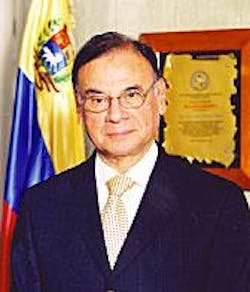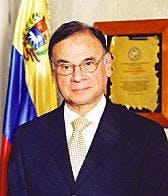Rodríguez reaffirms PDVSA's energy integration plans
Alí Rodríguez Araque, president and CEO of Venezuela's state-owned oil firm Petroleos de Venezuela (PDVSA), reaffirmed the company's commitment to integrate Latin America in terms of energy, with Venezuela as the link for the successful completion of this movement.
On Oct. 6, during the Rio Oil & Gas Expo 2004, Rodríguez said that the energy integration project to create Petroamerica is advancing.
"Petroamerica is an idea that takes into account the energetic reality and the opportunities in Latin America. Various countries have important energy reserves, hydroelectric [power], and fossil [fuels]. The Andean countries—Brazil, Mexico and parts of Argentina—have abundant hydrocarbon resources.
"Since for many years we have talked about the economic integration of Latin America, there is no doubt that the energy sector of a modern economy can become the backbone of the continental integration," said Rodríguez.
Venezuela and Argentina
As examples of energy integration advances, Rodríguez spoke about the cooperation agreement between PDVSA and Argentinea's commercial nuclear enterprise Enasa. According to Rodríguez, PDVSA would not actually merge with Enasa or any other companies.
The accord still must be approved by Argentina's parliament. Local analysts say that the ruling party in Argentina is divided and it might take a long time for the agreement between Venezuela President Hugo Chávez and Argentina President Néstor Kirchner to become law.
"Venezuela has abundant oil reserves. While Argentina has much gas and some oil reserves, at present discoveries have been insufficient. However, Argentina has abundant agricultural and livestock resources, which Venezuela will need for a while—we don't know for how long. We are importing seeds, agricultural products, and meat from Argentina while exporting oil products and natural gas to cover urgent needs in Argentina," he added.
Brazil and Venezuela
Rodríguez also said that he was talking with José Eduardo Dutra, president of Brazil's state-owned Petroleo Brasileiro SA (Petrobras), to establish joint projects in lubricants and refining as well as to have the Brazilian company's cooperation in deepwater exploration and production "for which Petrobras has received international recognition," Rodríguez said.
"Despite the fact that Brazil and Venezuela have adopted different political and macroeconomic policies, with Brazil following an orthodox path and Venezuela adopting a socially oriented direction, this will not affect possible cooperation agreements between the two state-owned companies," Rodríguez told OGJ.
The Venezuelan executive pointed out that, "despite the fact that the majority of Petrobras's shares are owned by the government, a significant number of shares are in private hands."
However, since 2002 several oil and gas E&P agreements between Brazil and Venezuela have been signed and so far nothing has become a reality. Terms have included the construction of a $3 billion refinery in Brazil and, in 2003 both countries signed a financial cooperation pact.
"There is no doubt whatsoever that the most important thing at this juncture is to ascertain the causes underlying why the process of integration should not advance beyond mere speeches full of good intentions," added Rodríguez.
PDVSA is continuing talks with Brazil's Espírito Santo state government for building a $2 billion refinery, Rodríguez said. But these talks have been going on for some time and so far no concrete agreements have been signed.
Despite the opening of Brazil's oil sector in 1997, Petrobras still dominates the upstream and owns most of the downstream infrastructure including 11 of the 13 refineries in the country.
Analysts say that the project between PDVSA and Espírito Santo state could hardly come off the drawing board without the Brazilian government's approval.
Petrobras also has invested heavily in Argentina's petroleum sector as well as in Bolivia's upstream and downstream sectors and is investing millions of dollars to become an international energy company with particular focus in Latin America. Experts consulted by OGJ believe that this could make Petrobras balk at joining Petroamerica.
Rodríguez also said that his government as well as the governments of Paraguay and Bolivia were in advanced negotiations for energy integration.
International oil prices
Turning to the issue of record high world oil prices, Rodíguez said, "Venezuela's policy has been in favor of the stabilization of the oil markets and to contribute to the strengthening of the Organization of Petroleum Exporting Countries, via the mechanism of the regulation of production.
The worst thing to happen for producers is the volatility of prices, which makes economic planning extremely difficult."
Rodíguez argued that "what has most influenced current prices is not the relation between supply and demand. There is plenty evidence that the market has been sufficiently supplied with oil. Non-OPEC countries are producing 54 million b/d of oil and OPEC countries 30 million b/d, while worldwide demand is of 81 million b/d of crude."
For Rodíguez, other factors have influenced prices, such as the insufficient refining capacity in the US. "Some 2 years ago, when we first analyzed this problem with OPEC, we reached the conclusion that the US needed to expand its refining capacity by 2.7 million b/d. For over 25 years no new refineries were constructed, which forces the US to constantly import gasoline and this, in turn raises the price on the market, causing an impact upon prices throughout the Atlantic region," he affirmed.
"Another factor that distorts prices is the speculation on futures markets. At [the New York Mercantile Exchange] large paper volumes of oil contracts are negotiated.
When speculators perceive that there could be an increase in demand or in prices, they buy significant numbers of contracts that could represent 160,000-180,000 bbl on paper, while in the physical market the reality is that 80,000-82,000 bbl are being negotiated. Speculators artificially increase the price of a barrel [of oil]. And all this might have nothing to do with OPEC's actions."
However, Rodíguez said that international oil prices should not drop below $40/bbl. PDVSA's president reaffirmed that Venezuela has no intention of cutting oil exports to the US (about 12% of oil imports to the US come from Venezuela) and wants to maintain and strengthen commercial ties with the US.

